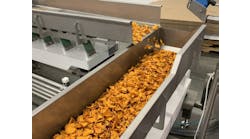Q. What flooring system would you recommend for the constantly-wet floors of a food processing plant that are cleaned using high-pressure washes and/or steam?
A. To make the proper assessment, your coatings supplier should go through a series of steps to evaluate corrosive chemical exposures, service conditions and cleaning components before making a product recommendation matching a facility’s performance and aesthetic needs.
Mitigating potential moisture-related problems and dealing with thermal shock are areas of expertise all their own. We are big believers in urethane cement technology for protecting the assets of this unique market. Some resinous flooring can expand at 10 times the rate of concrete, and system failure will result in blistering and disbondment.
Flooring systems should be at least ¼-in. thick to minimize the detrimental effects of this phenomenon. A urethane cement flooring system with a coefficient of linear thermal expansion closer to that of the concrete will provide a life expectancy that far exceeds traditional epoxies in similar environments.
Food plants must reduce costly downtime without sacrificing quality. Questions to ask when considering a remedy for the situation above include:
- Can the system be applied on a damp surface without primer?
- How quickly can the surface be put into complete service?
- Is the system truly resistant to the cleaning agents used?
- Is antimicrobial technology available in the coatings formulation?
- Can the coating be made decorative with the addition of paint chips or quartz?
Answered by John Durig, market development director, food & beverage, Sherwin-Williams Co. (www.sherwin-williams.com/protective)

